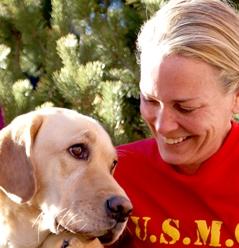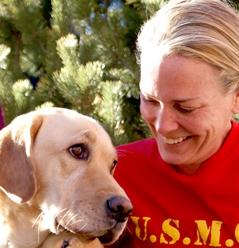
Credit: University of Colorado
The Canines Providing Assistance to Wounded Warriors team (C-P.A.W.W.), a small nonprofit veterans' health research initiative based at the University of Colorado College of Nursing at the Anschutz Medical Campus, recently received funding to conduct an innovative study to evaluate how shelter dogs physically and psychologically impact veterans with post-traumatic stress disorder.
A robustly developing body of work suggests that interacting with animals, particularly dogs, benefits human physiological and psychological health.
The research team will work with the WYCO Vet-to-Vet Alliance, a support and advocacy organization for veterans based in Fort Collins and embedded into to the local community, to reach out to area veterans for participation in this investigation.
"Our study's findings have the potential to contribute physiological and psychosocial evidence indicating that volunteering at a dog shelter can decrease stress and enhance quality-of-life indicators in reintegrating veterans with PTSD," said principal investigator Cheryl Krause-Parello, PhD, RN and assistant professor at the CU College of Nursing. "This study may also give us some valuable insights regarding how shelter dogs themselves are impacted by being socialized with and exercised by veterans. In the future, this investigation could help shape the development of policies and volunteer programs at dog shelters implemented specifically for veterans coping with PTSD."
Veterans in the study will walk shelter dogs at Animal House Rescue and Grooming in Fort Collins in an eight-week intervention aimed at reducing stress levels and improving psychological outcomes. Researchers will collect various measures of physiological stress from veterans, including heart rate variability, blood pressure and salivary cortisol and alpha amylase levels. Additionally, they will examine stress levels in the shelter dogs themselves by collecting the heart rate variability of the dogs involved in the study. Importantly, the investigation will examine the reciprocal nature of human-animal interaction and may help to uncover mechanistic underpinnings of the effects that interacting with canines have upon veterans coping with post-traumatic stress.
According to researchers, it is of particular relevance to consider the large number of shelter dogs in the United States in the context of the potential for these dogs to be a feasible, highly economical, unique resource and intervention that combines the benefits of human-animal interaction with the benefits of the altruistic action of volunteerism. This study may help to lay the groundwork for policy changes and future studies specifically examining the effects that psychiatric service dogs have upon veterans with post-traumatic stress.
The 18-month study is funded from an International Society for Anthrozoology/WALTHAM Collaborative Research grant. WALTHAM is the fundamental research center of Mars Petcare and for over 40 years has been supporting groundbreaking research that explores the special relationship between humans and companion animals.
The American Society for the Prevention of Cruelty to Animals estimates that 3.9 million dogs currently live in shelters nationwide. The United States is home to more than 21 million veterans. In Colorado alone there are more than 413,000 veterans. In recent years, the remarkable number of veterans returning home from Operation Iraqi Freedom and Operation Enduring Freedom has highlighted the vital need for developing and enhancing effective and consistent healthcare interventions for our service members, particularly with regard to post-traumatic stress.
Up to 30 percent of veterans struggle with post-traumatic stress, dependent upon deployment era. Nonresponse to current treatments is common, and the utilization of pharmacological interventions to ameliorate symptoms associated with post-traumatic stress has skyrocketed in recent years. The development of alternative or adjunctive treatment modalities for veterans coping with post-traumatic stress will be essential in order to generate personalized, feasible, and efficacious treatment plans that help to minimize stigma and optimize the ongoing process of reintegration for service members.
###
About the Canines Providing Assistance to Wounded Warriors (C-P.A.W.W.) Initiative:
The C-P.A.W.W. Initiative was established in October 2013 to advance the health and well-being of members of the armed forces. C-P.A.W.W. is committed to the evolution of nursing knowledge within the context of research, education and practice in order to better assist the military population. The mission of C-P.A.W.W. is to comprehensively advance interdisciplinary research, education and practice protocols for wounded warriors and veterans through the development of evidence-based and restorative interventions, to support military-related health initiatives by building community partnerships, to investigate therapeutic interventions–particularly those involving canine assistance– that positively influence health outcomes, and to emphasize system planning, innovative public policymaking, and thorough protocols of care development for the armed forces. Read more here: http://www.nursing.ucdenver.edu/C-PAWW
The University of Colorado College of Nursing has been educating high-performing nurses and nurse leaders since 1898. It has achieved a 118-year record of quality nursing education and excellence in health care. In 2015, the college celebrated the 50th anniversary of nurse practitioner education, which was first established at CU in 1965.
Media Contact
Nathan Gill
[email protected]
303-319-5073
@CUAnschutz
http://www.ucdenver.edu





